Rising inflation, soaring interest rates, and the continuous depreciation of the naira may force an additional 13 million Nigerians below the national poverty line by 2025, according to a new report by PricewaterhouseCoopers (PwC).
The report, titled “2025 Nigerian Budget and Economic Outlook,” highlights the severe economic pressures facing the country, noting that these challenges are exacerbating the cost of living for millions of citizens.
“Macroeconomic pressure points such as rising inflation, interest rates, and naira depreciation may drive an additional 13 million people below the national poverty line by 2025,” PwC stated.
The British consultancy firm further emphasised that the number of people living in poverty is expected to rise significantly, largely driven by the country’s persistently high inflation and deteriorating economic conditions.
The World Bank reported that Nigeria’s poverty rate has escalated from 40 per cent in 2018 to 46 per cent in 2023, affecting over 104 million people.
Factors such as fuel price hikes and insufficient economic reforms are exacerbating the situation, leading to increased hardship for many Nigerians
Nigeria’s headline inflation rate, as reported by the National Bureau of Statistics, climbed to 34.80 per cent in December 2024, further straining household incomes and driving up the cost of basic necessities.
To reduce the number of Nigerians falling below the poverty line, several measures can be implemented.
Macroeconomic Reforms: Implement fiscal, trade, and exchange rate policies to diversify the economy and create productive jobs.
Education and Skill Development: Invest in education, particularly for girls, and vocational training to enhance workforce skills and economic productivity.
Economic Diversification: Reduce reliance on oil by promoting agriculture and other sectors, creating stable job opportunities.
Infrastructure Investment: Improve infrastructure to boost economic activity and connectivity, facilitating access to markets and services.
Social Protection Programmes: Expand social safety nets to support vulnerable households against income shocks.
Financial Inclusion: Enhance access to financial services, especially for women and rural populations, to stimulate entrepreneurship and economic participation.





